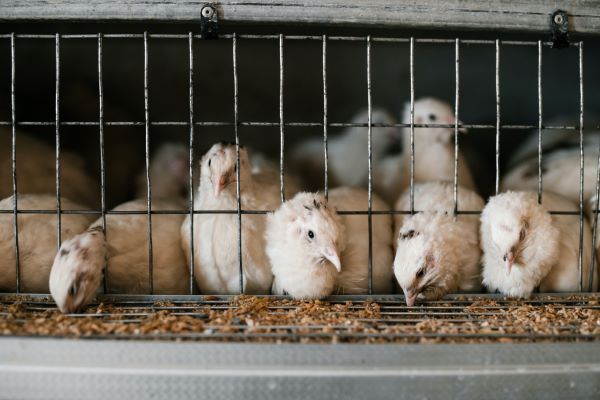As the country’s worst ever national avian influenza outbreak continues to gain momentum retailers are rationing egg and poultry stocks, but are we missing the point?
Over the past weeks, news reports have detailed how vendors are clambering to secure egg supplies as the new outbreak of bird flu has been devastating the poultry sector, with customers panicking in the face of scarcities and price increases.
The number of avian flu cases in the country is at the highest point since the first outbreaks at commercial farms in 2017, with some poultry producers reporting a loss of almost two million chickens this year so far, worth more than R100 million. But instead of putting the egg before the chicken and fixating on the lack of product availability; maybe we’re failing to identify the real problem.
A Fowl Addiction
Our huge appetite for poultry and eggs means that there are over 34 billion chickens on the planet at any given time, according to the United Nations Food and Agriculture Organisation, accounting for 70 percent of all avian biomass – which is in itself amazing when you keep in mind that there are over 10,000 distinct bird species. So most of these animals today are either trapped in a cage forced to lay eggs, or in a crowded stockade being primed for slaughter.
We’ve got the same problem on home soil as South Africans tend to binge on chicken. In 2018 the processed poultry segment alone accounted for around 46.2 percent of the domestic fast food market share and is expected to experience growth at a CAGR of 7.6 percent from 2019 to 2026, according to Allied Market Research. Kentucky Fried Chicken alone is by some margin the most prolific fast food brand in the country – among other competitors such as Nando’s and Pedros – with nearly 1,000 stores nationally holding 24.3 percent of the fast food market by sales.
Eggs feature significantly in the domestic diet. The Department of Agriculture reports that the national laying flock was estimated at 28.89 million hens in 2020, with nearly 2,000 producers delivering 594,000 tons of eggs. As a nation we’ve become so reliant on poultry products that we’ve scarcely thought about that idea that we don’t necessarily need it.
The current scale of production relies on heavy antibiotic use, known to aid in bulking animals up, but largely to combat the outbreak of infectious diseases on farms. However it’s well understood by now that the excessive use of antibiotics simply produces more resistant microbes with longer life cycles that can only be controlled – at least most of the time – by increasing the dosage.
South Africans had a tough start to the decade and we’re no newcomers to zoonotic illnesses. The Covid-19 pandemic ravaged the economy, but not to be outdone; we’re also visited frequently by foot and mouth disease and deadly listeriosis outbreaks, with renewed warnings about beef products. As a pathogen Covid-19 has been the beneficiary of endless publicity, but let’s not forget about all the slightly lesser plagues in the theatre of public awareness that make repeat appearances in our food system.
According to the World Health Organization more than half of all human pathogens are zoonotic. Since the pandemic there has been increased vigilance in the global community, but at best we’ve been reliant on cullings and quarantines to try and suppress the problem instead of treating it at its source.
In the past four decades infectious diseases have increased at more than four times the rate of prior decades, most of which have zoonotic origins. Coupled with the rising demand for animal products, particularly in developing countries, it fosters the spread of disease largely due to high-density animal confinement and their waste. This creates an agricultural trap; a vicious cycle for routine outbreaks and the emergence of dangerous novel strains; and nobody alive today needs a lesson in how catastrophic these can be.
Chickens and pigs are fed more than three times the antibiotics than cattle are in intensive production systems. As far as breeding disease goes on a commercial scale this is the worst of the worst and any given farm is a petri dish for the next pandemic. Surely we have better options available to us and as a country heavily reliant on poultry every South African should be asking whether there isn’t something else they should rather be eating.
Avian flu has become endemic to South Africa and we can’t expect the situation to improve until we address our own personal dietary habits. We’re a society addicted to animal products and these outbreaks spotlight how we’ve become prisoners of our own brand of gluttony; destined for the same outcomes – unless we can start to change, even moderately.
Decreasing meat, poultry and egg consumption by relying more on plant-based alternatives is arguably the best way to mitigate these threats since it addresses the heart of the problem. Due to mass production poultry is cheap in South Africa and some might feel like they could avoid the shortage by simply relying on other animal products in the interim – at least for those who can afford it – but this mainly has the long term effect of shifting the same maladies from one part of the food web to another.
Obviously our egg shortage won’t last forever, but if we just ignore why these outbreaks keep happening in the first place then we just set ourselves up to stumble again – predictably – into the next one. Whatever your dietary habits are, surely all South Africans can agree that we are better off without these completely preventable risks.
By exploring the crucial connection between the current crisis and our animal-based food system, the ProVeg Food & Pandemics Report highlights how our food choices help to create a recipe for zoonotic pandemics. By shifting to plant-based and cultured foods, we can help to minimise the risk of future pandemics as well as helping to resolve many of the other key challenges we face; including climate change, biodiversity loss, world hunger, antimicrobial resistance, and the rise of other food-related diseases.
But in the meantime: what do we do without eggs? How do we fill this gap on the menu? It’s not hard at all and ProVeg has some suggestions.
Replacing the Prized Beige Oval
Apart from acting as a protein source, eggs are a versatile ingredient also utilised as a binder and emulsifier in many recipes and sauces across cultures and cuisines. While some may think of it as a healthier alternative to red meat, it isn’t necessarily the case. For example, one large egg contains approximately 195 milligrams of artery-clogging cholesterol, which is more than twice as much as a McDonald’s Big Mac – at an already whopping 85 milligrams. The reputation of eggs as a “health food” is largely a myth.
Eggs really aren’t as indispensable to the pantry as people tend to believe and there are plant-based options that can substitute in any recipe.
Here are some recommended food swaps:
- Chicks dig the egg analogues offered by ‘Oh my Cluck’, including fry-able and poach-able eggs, and hollandaise sauce. Vegan Street Foodalso sells their ‘Oh my Crack!’ range of vegan eggs.
- Orgran has an egg replacer for all your needs from baking to mayonnaise.
- Ripe bananasand applesauce both work as a vegan egg substitute helping bind, adding moisture and giving density to baked goods.
- Chickpea flour:High in protein, chickpea flour works as both a binding and raising agent and is one of the best natural egg replacements in baked goods, with a surprising similar texture and flavour to eggs.
- Linseed and Chia seeds: Famous for their healthy fats, these highly nutritious seeds are packed with antioxidants and can also be used as a vegan egg substitute when ground or soaked.
- Aquafaba:This is the name for the viscous, gluey water in which legumes such as chickpeas have been cooked. Roughly translated from the Latin for ‘bean water’, this vegan substitute can be used in place of egg whites since the proteins and starches are structurally very similar.
- Agar-agar: This jelly-like substance is derived from algae and makes a great substitute for gelatin in certain baked goods and cold set desserts.
- Arrowroot:Sometimes sold as ‘tapioca starch’, this option is obtained from the roots of several tropical plants. Convenient when you need to thicken a sauce without the use of eggs or a butter and flour-based roux.
- Some suggest that you can’t make an omelette unless you break a few eggs; that is of course unless you have some tofuin the kitchen. Silken tofu adds a creamy texture when used as an egg substitute in cheesecakes, ice cream, sour cream, or puddings. Firm tofu is an option for egg-free works best in savoury dishes such as quiches, frittatas and scrambles.
- To better imitate the flavour of eggs black salt, also known as kala namak, is a volcanic salt traditionally used in Asian cuisine. Due to its high sulphur content, black salt has a strong taste similar to that of eggs. Turmeric, known for its anti-inflammatory properties, is an affordable spice that will impart an egg-like yellow glow to any recipe.
The sustained consumption of eggs and mass production of poultry has harmful outcomes to the environment, personal health, as well as our carbon footprint. Egg-free alternatives are by no means specialty products. South African consumers worried about the increasing cost and availability of eggs can bypass these concerns by dropping them off their grocery lists and instead reaching for a few plant-based equivalents.








